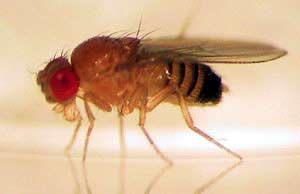During the recent journey of the Space Shuttle Discovery, which covered a distance of 8.48 million kilometers, approximately 300 fruit flies and their eggs were “accompanied“
 |
Fruit Flies (Photo: innate) |
in the cabin, allowing these tiny creatures to experience the space environment. Scientists from the National Aeronautics and Space Administration (NASA) and three American universities believe that the fruit flies’ “travel experience” could help uncover the mysteries of the human immune system in preparation for missions to the Moon and Mars.
The reason fruit flies were chosen for this study is that this insect species reproduces quickly, has a short life cycle (60 days), and exhibits weak adaptability to environmental changes. According to the lead researcher, geneticist Deborah Kimbrell from the University of California, although the immune system of fruit flies is simpler than that of humans, the genetic structures of both are very similar, making fruit flies an ideal model for observing and understanding human immune responses in space.
The crucial question is whether the immune system is compromised after prolonged space travel. To find the answer, scientists infected two groups of fruit flies (one raised on the Discovery and a control group at the Kennedy Space Center, both having the same diet and living conditions as in space) with fungi and bacteria.
The aim was to compare the immune responses of both groups, including tests such as blood cell counting and clotting ability. Initial results indicate that the immune system was not a significant issue during the recent tests. However, scientists suggest that since this study was conducted over two weeks, the results may differ significantly from those of extended journeys lasting two years or more.
HOÀNG ĐIỂU


















































